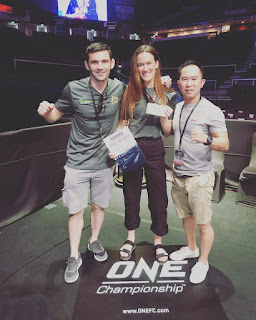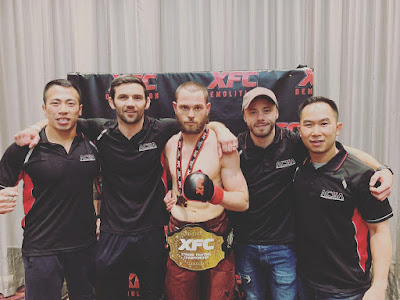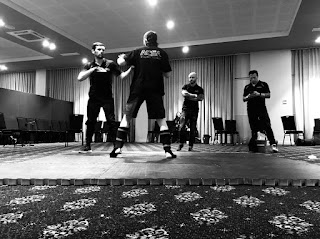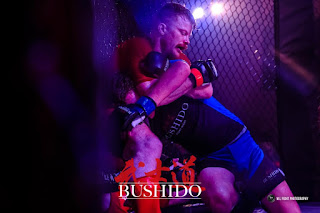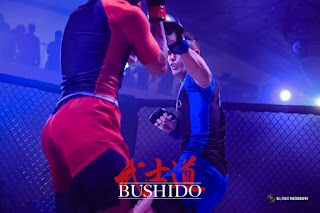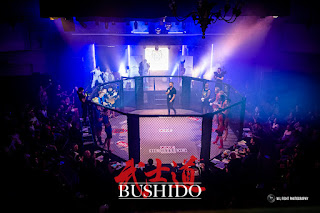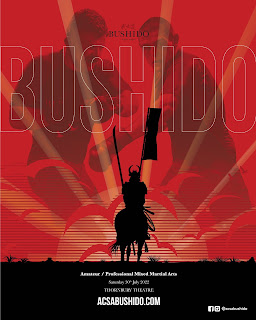Sunday 30 August 2020
Kaizen - Constant daily improvement
Tuesday 11 August 2020
MMA Striking Class Video
Thursday 28 November 2019
Advice for MMA Fighters - MMA Melbourne
As a coach, one of the worst things a fighter can do is to train hard in the lead up to a fight and then quit training straight afterwards. This is even worse when the fighters teammates also have upcoming fights to prepare for. It is very unlikely the coach will be prepared to put the same effort into training the fighter in the future if he knows they lack commitment. Another side of this is to not chop and change your training every couple of weeks, stick with what has been getting you results and gradually increase the volume and intensity of your training.
At the elite levels of any sport, every player is playing injured all the time. Get used to it, strap up your injured knee, elbow or foot and keep going. Select different exercises or techniques that won't exacerbate the injury but avoid taking time off at all costs. If training consistently to achieve your goals is important to you you will find a way to make it happen, if it's not important you will find an excuse.
The amount of extra training you'll get done by not working will usually end up not being worth it. Most gyms and martial arts schools do most of their training outside of work hours. Even if you quit your job in order to train full time most of your training partners will be at work.
Focusing on only one area at the expense of other skills will leave holes in your game which will be easily exploited by more experienced future opponents. Competing in other combat sports such as BJJ or amateur Kickboxing is a good safe way to gain valuable experience and develop your skills so that you are more well rounded and more of a threat when you fight in MMA.
Check out our MMA Classes at ACSA MMA & BJJ Melbourne
Monday 21 October 2019
ACSA MMA Fighter Mitchell Carter wins the XFC Title - MMA Melbourne
This weekend my student Mitchell Carter won the XFC Amateur Featherweight Title. XFC is the longest-running MMA promotion in Australia and this was their first-ever event in Melbourne.
Mitchell has been training hard as part of our MMA fight team and has won four MMA fights, one Boxing match and a NOGI Jiujitsu tournament in less than a year.
In the leadup to this title fight, Mitchell put in a solid eight weeks of preparation focusing on his takedown and wrestling skills as well as adding some new tools to his striking arsenal.
He actually had three changes of opponent for the fight due to injuries and pull-outs. His eventual opponent was a very good, experienced striker who Mitchell fought once before. The end result was a great fight and a good clash of styles.
Thanks to everyone on our team who helped out in the preparation in the weeks leading up to the fight. How a fighter performs on the night of a fight is a direct result of the training partners who he has trained with day in and day out over the weeks leading up to the fight. We are very lucky at Australian Combat Sports Academy to have so many great strikers and grapplers all training together under one roof in a safe environment that allows us to get great results like this.
Monday 14 October 2019
The Importance of Amateur MMA - MMA Melbourne
The Importance of Amateur MMA - MMA Melbourne
One of the biggest problems I see with aspiring fighters is that they are in too much of a rush to fight Pro. If you intend to have a successful long term fight career it is essential to gain as much experience as possible as an amateur. Generally, you will only get one shot at a contract with a major promotion such as the UFC so it's important that you are close to being the finished product when you get there rather than hoping you'll improve once you get there.
Monday 30 September 2019
My 5 Most Popular Blog Articles
Here are my 5 most popular articles since I began writing my MMA coaching blog in 2012.
Tuesday 12 February 2019
Deliberate Practice
Monday 21 January 2019
My MMA Journey - Part 3
After my win in Italy at the end of 2003 I was keen to get back in and have another go as soon as possible. Unfortunately, there weren't as many opportunities to fight or MMA events taking place at that stage. I kept myself busy by competing in BJJ, KSBO amatuer MMA events and also some Jiu Jitsu Kumite events which were mixture of semi contact karate and grappling. I was also pretty busy at this time with work and exams, but as soon as my exams were over I made a big push to get matched up for as many MMA matches as I could get.
I had four pro MMA fights in four months from June to September 2004. I won three of those and the fourth was given as a draw however it was one of my most dominant ever fights. I took my opponent down and punched and elbowed him from guard for three straight rounds. In between these fights I also competed in regularly in BJJ and grappling events.
I found all my own matches by contacting promoters and offering to fight anyone they had at a similar weights. Then a group of us would head off on a road trip on Saturday to the other side of the country. Weigh in, have a fight then drive home later that night. Looking back now that probably wasn't the best way to manage a Fight career but I wanted to keep improving and to me that meant testing myself and staying active. I had to fight whoever was offered and keep working to get better between every fight.
Throughout all these fights and during the training camps I was suffering from instability in my knee. I could still and compete but it would pop out every now and again (including during one of my fights) and I needed to keep it heavily taped up when I fought. At the end of 2004 I was booked in to get ACL reconstruction surgery and this put my fight career temporarily on hold.
In Feb 2005 I had a full ACL reconstruction. This can usually take a long time to recover from but I wanted to make sure I was fight ready as soon as possible after the surgery. The first two weeks I was off work stuck at home wearing a huge knee brace and using crutches, as soon as I could walk again I got back to light weight training and also did rehab physio sessions once a week. About a month after the surgery I got back to boxing, however focusing more on punching and not so much footwork. During this time I did most of my boxing training at the Fitzroy Lodge gym in south London.
I also had more exams around May of this year so once my exams were done I wanted to return to full training. Approximately five months after my knee surgery I was ready to get back to grappling training and was able to compete in a grappling tournament again a few weeks later.
Around this time I also got offered a shot to fight on a new MMA promotion which would take place in London in October. I was very keen to get back in and fight to make up for my lost time. In the months leading up to this fight I also went on two training trips, firstly to Amsterdam where I got to train with many legends of Dutch Kickboxing including Ernesto Hoost, and then a few months later I traveled to Brazil where I trained at Brazilian Top Team, which was the leading MMA team in the world at that time.
My first fight back after surgery was against Ciro Gallo in York Hall, Bethnal green. I dropped him with a punch right at the start of the round then got a Judo style Turtle rolling armbar. I was happy with the result of this fight as I had been out of full training and fighting for so long. However as always when I felt a fight was too easy I also had a slight feeling of disappointment that it wasn't enough of a challenge and that I had wasted several months of training and preparation but hadn't really tested myself. However I was never really the type of fighter to pick and choose my opponents or even to bother finding out much about them before i stepped into the ring. I just fought whoever was in front of me. I didn't look as MMA fighting as a career or even a sport. I just looked on it as a realistic way of testing my martial arts skills. If you get attacked on the street you don't get to pick and choose who you get attacked by, you don't ask for someone who is closer to your weight or has a similar record and you certainly don't ask your attacker to come back on another day because you've got a cold or sore elbow.
Tuesday 4 December 2018
My MMA Journey - Part 1
Part 2 coming soon.
Sunday 1 October 2017
Tough on your Team.
Popularity Versus Performance
One of the great lessons we learned from sports coaching expert Wayne Goldsmith earlier this year was that 'popularity is the enemy of performance'.
Being Honest with your Team-Mates
If you care about your teammate’s progress and success then you need to be honest with them about their training. If your training partner is on a losing streak and you don’t want to see them get knocked out in their next fight you need to be honest with them and tell them that training two hours a week then going for a run on Saturday isn’t going to get the job done.
The Reality
The reality is that your next opponent doesn't care whether you are a nice person and doesn't worry about offending you. He is going to be brutally honest with you over the course of three five-minute rounds and will highlight the areas of your training where you took shortcuts
Tough Coaching
The same is also true when it comes to coaching. Most fighters early in their career are open to advice and constructive criticism. They want to be told where they are going wrong and what they need to improve on. They realise that there will be a huge price to pay if they don't fix up the holes in their game. The job of the coach is to identify these holes and fix them before they can be exploited by a future opponent.
Coaches Versus 'Yes-Men'
If the fighter follows the advice of the coach he will usually experience initial success early on in his career. But this is when something interesting starts to happen. Often the fighters early success will cause him to develop an overblown ego, he decides he no longer needs to be told what he's doing wrong and instead surrounds himself with people who will constantly feed his ego by telling him what he's doing right and how great he is.
“A coach is someone who tells you what you don't want to hear, who has you see what you don't want to see, so you can be who you have always known you could be.”
Thursday 6 April 2017
Fight Training Mistakes
What is your Goal and What will it take to get there?
What Stage are you at in your Fight Career?
How much Training are you really doing?
Are you doing the Right kind of training or Just doing what you Enjoy?
Are your Training Partners helping you to become a better fighter?
Are you Actually getting any better?
Are you actually sticking with the program or chopping and changing every few weeks?
Long Term BJJ Training
Eleven years ago since I got my black belt and I thought this would be useful advice for anyone who is in the earlier stages of their JiuJi...

Popular Posts
-
We have two great seminars coming up soon: On Thursday 7th February we have Alex Volkanovski and Frank Hickman for an MMA Wrestling Semi...
-
Why do some people succeed with their Martial Arts training while others never get anywhere? Over the years of running our gym I...
-
Why do some MMA fighters have successful careers while others start off well but then quickly go downhill? I’ve seen fighters have a lo...

